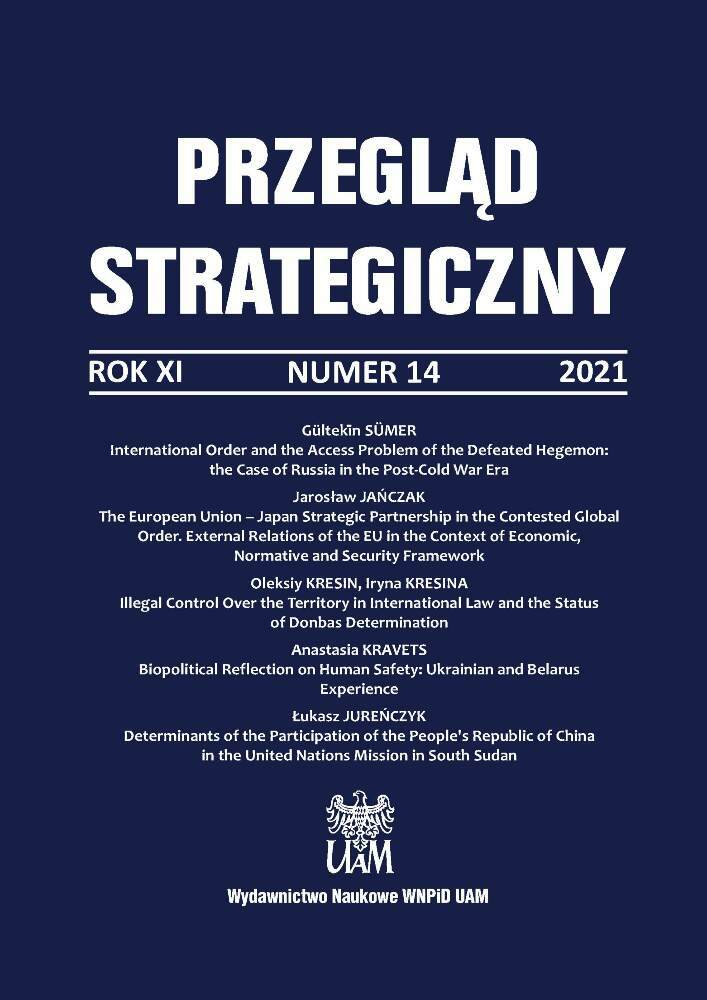Abstract
It has been evident that Russia as the heir of Soviet foreign policy, could neither achieve to integrate herself into the international order, nor could the international order achieve to find a solution to Russian foreign policy identity quest. As long as Russia cannot find a stable and permanent status for herself in the world politics, her foreign policy will signify a permanent instability on the behalf of the international order. The current hegemonic international order is far from residing technical capabilities in terms of satisfying Russia’s foreign policy expectations, because it is unprecedentedly rigid in terms of allowing or refusing the incorporation of hegemonic power like Russia. While it cannot return to multipolarity, it could not set a community based international order either. Since the current international order was founded upon liberal anti-Soviet values, it entered into a lightness of exposing Russia to make clear-cut choices in her foreign policy. As much as the current international order was founded upon liberal anti-Soviet values, its demands from the new members would much higher that especially Russia would not easily adapt herself to.
References
Bull H., Watson A. (1989), The Expansion of International Society, Oxford.
Choucri N., North R. C. (1975), National Growth and International Violence, San Francisco.
Clinton B. (2005), My Life, London.
Contessi N. (2016), Prospects for the accommodation of resurgent Russia, in: Accommodating Risng Powers, edited by T. V. Paul, Cambridge.
d’Encausse H. C. (2010), La Russie entre Deux Mondes, Paris.
Gilpin R. (1981) War and Change in World Politics, New York.
Götz E., Merlen C. (2019), Russia and the Question of World Order, “European Politics and Society”, 20(2), 133–153.
Gvosdev N. K, Marsh C. (2014), Russian Foreign Policy: Interests, Vectors, and Sectors, Los Angeles.
Ikenberry J. I., Kupchan C. (1990), Hegemonic Powers and Socialization, “International Organization”, 44(3), 283–315.
Kaplan M. (1957), System and Process in International Politics, New York.
Kennedy P. (1989), The Rise and Fall of the Great Powers, New York.
Kennedy P. (1980), The Rise of the Anglo-German Antagonism(1860–1914), Atlantic Highlands.
Kissinger H. (2000), A World Restored: Metternich, Castlereagh and The Problems of Peace 1812–1822, London.
Kissinger H. (2014), World Order, London.
Krastev I., Leonard M. (2014), The new European disorder. London: European Council on Foreign Relations, Retrieved from http://www.ecfr.eu/page/-/ECFR117_TheNewEuropeanDisorder_ESSAY.pdf.
Kupchan C. (2010), How Enemies Become Friends:The Sources of Stable Peace, Princeton.
Lo B. (2002), Russian Foreign Policy in the post-Soviet Era: Reality, lllusion and Mythmaking, Basingstoke.
Lo B. (2015), Russia and the New World Disorder, Washington D.C.
Marks S. (1976), The Illusion of Peace: International Relations in Europe 1918–1933.
Matlock J., The Mistakes We Made with Russia and How to Stop Making Them, https://www.youtube.com/watch?v=VmP513n78YE.
McFaul M. (2018), From Cold War to Hot Peace: An Ameican Ambassador in Putin’s Russia, New York.
Mearsheimer J. J. (2014), Why the Ukraine Crisis Is the West’s Fault: The Liberal Delusion That Provoked Putin, “Foreign Affairs”, 93(5), 77–89.
Russia’s many Interest in Syria, http://www.washingtoninstitute.org/policy-analysis/view/russias-many-interests-in-syria.
Sakwa R. (1993), Russian Politics and Society, London.
Orttung R., Walker C. (2015, February 13), Putin’s frozen conflicts. Foreign Policy (online), Retrieved from http://foreignpolicy.com/2015/02/13/putins-frozen-conflicts/.
Shevtsova L. (2007), Russia: Lost in Transition, Carnegie Endowment for International Peace, Washington D.C.
Primakov Y. (2004), Russian Crossroads, New Haven.
Stent A. (2014), The Limits of Partnership:US-Russian Relations in the Twenty-First Century, Princeton.
Stone O. (2017), Interv’ju s Vladimirom Putinym, Moskva.
Trenin D. (2006), Russia Leaves the West, “Foreign Affairs” 85, No. 4 July–August): 87–96.
Tsygaknov A. P. (2016), Russian Foreign Policy: Change and Continuity in National Identity, Rowman &Littlefield-London.
Watson A. (1992), The Evolution of International Society, London.
Atlantic Council Speech, https://www.c-span.org/video/?407763-1/nato-secretary-jens-stoltenberg-remarks.

